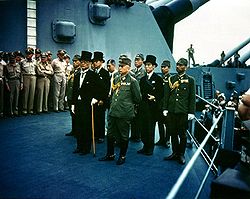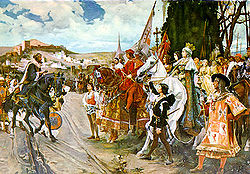- Surrender (military)
-
 Balian of Ibelin surrendering the city of Jerusalem to Saladin, from Les Passages faits Outremer par les Français contre les Turcs et autres Sarrasins et Maures outremarins, ca. 1490.
Balian of Ibelin surrendering the city of Jerusalem to Saladin, from Les Passages faits Outremer par les Français contre les Turcs et autres Sarrasins et Maures outremarins, ca. 1490.
 General Percival marches to surrender 80,000 British troops after the Battle of Singapore in World War II.
General Percival marches to surrender 80,000 British troops after the Battle of Singapore in World War II.
 Representatives on board the USS Missouri to effect Japan's complete surrender following its defeat in World War II
Representatives on board the USS Missouri to effect Japan's complete surrender following its defeat in World War II
Surrender is when soldiers, nations or other combatants stop fighting and eventually become prisoners of war, either as individuals or when ordered to by their officers. A white flag is a common symbol of surrender, as is the gesture of raising one's hands empty and open above one's head.
When the parties agree to terms, the surrender may be conditional, i.e. if the surrendering party promises to submit only after the victor makes certain promises. Otherwise it is a surrender at discretion (unconditional surrender); the victor makes no promises of treatment other than those provided by the laws and customs of war — most of which are laid out in the Hague Conventions (1907) and the Geneva Conventions. Normally a belligerent will only agree to surrender unconditionally if completely incapable of continuing hostilities.
The Third Geneva Convention states that prisoners of war should not be mistreated or abused. United States Army policy, for example, requires that surrendered persons should be secured and safeguarded while being evacuated from the battlefield. Similar regulations exist in most modern militaries.
Entire nations can also surrender in an attempt to end a war or military conflict. This is done through an unconditional capitulation or the signing of a treaty, such as an armistice or peace treaty.
See also
- Capitulation
- Debellatio occurs when a war ends because of the complete destruction of a belligerent state.
- No quarter occurs when a victor shows no clemency or mercy and refuses to spare the life of the vanquished when they surrender at discretion. Under the laws of war "...it is especially forbidden...to declare that no quarter will be given".
- Unconditional surrender is a surrender without conditions, except for those provided by international law.
- Strategic surrender
References
Categories:- Laws of war
- Surrenders
- Military strategy
Wikimedia Foundation. 2010.

